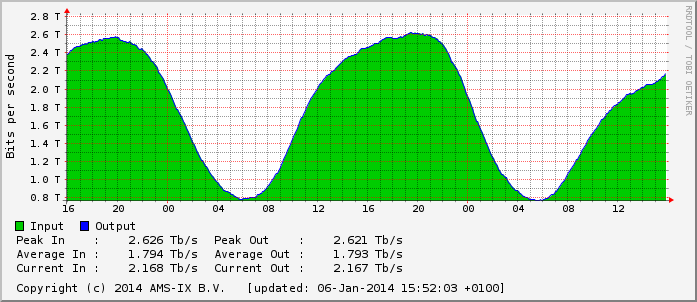

Before the internet, the cost of making a telephone call depended on the distance you were calling.
A local call was cheap (only one tick regardless of length in NL until the introductions of Bulletin Boards).
Outside the local area, calls were more expensive, and outside that, international calls, were even more expensive, largely getting more expensive, the further away you phoned.
For instance, mid-80's, a call to the USA would cost more than 4 guilders per minute, about €2 per minute (now 3 or 4 cents per minute).
The internet was set up as a sort of cooperative project.
If you wanted to connect to the internet, you had to find someone nearby, and connect to them; you only had to pay for your local connection costs.
When the Netherlands joined the internet (25 years ago!) we paid for an open telephone line (64kbps!) to the USA, which must have cost more than €1M per year!
You should know Moore's Law, which says that circuits get twice as dense every 18 months at the same cost.
Well, bandwidth doubles in speed at constant price PER YEAR! If so, we should expect that Amsterdam is now connected at a speed of 64kbps × 225 which equals 2Tbps.

The first thing I did when the internet was connected in 1988 was ftp to a site in New York, just to check it was working (it was).
But the interesting thing was: it didn't cost me any more to connect to New York than it did to connect to Amsterdam.
What this showed was that communication costs shouldn't be charged based on distance.
Of course there are expensive cables (and satellites) between Europe and North America, but these are one-time costs. Once they are running the costs are amortised over of thousands of simultaneous calls.
The really expensive part of the connection is your individual link the telephone exchange, which only you use.
Once the internet got fast enough (doubling per year), it started being possible to do voice calls over the internet. Skype wasn't the first, but it is probably the most used now.
Essentially, phone calls have become free with the right infrastructure.
Luckily, the internet isn't owned by anyone, so the telephone companies have had to sit by and watch their golden goose be slaughtered, and have been unable to do anything about it... There's no one to sue!
There are plenty of disruptive technologies visible that have taken over:
These aren't cases of bad management by the old tech firms. They were inevitable changes. The only response that an existing company can use is to get out!
Pre-internet, in order to provide content to the world you needed to
and these all demand an expensive infrastructure.
An author could try to do this all, but that would interfere with the time available to create stuff. And so you have publishers.
So the author creates the work, and the publishers take it and supply it to the world.
Most creators get almost nothing for this. A typical book contract gives an author 10%.
The average book nets an author €3000.
According to Courtney Love does the math, a $1M advance on an album gives band members each $45k to live on for a year, and they make nothing after that on the album, whereas the record company nets $6.6M. "The system's set up so almost nobody gets paid."
But we guarantee quality! claim the publishers. We select the good works, and make sure they get published.
Zen and the Art of Motorcycle Maintenance by Richard Pirsig, which was a bestseller as soon as it came out, was rejected by 121 publishers before it was accepted!
Doris Lessing was a best-selling author. In 1984 she decided to write a book under a pseudonym. The Diary of a Good Neighbour by Jane Somers was subsequently offered to Lessing's two main publishers (without telling them who had really written it, of course). They both turned the book down.
And of course the Beatles got turned down too. "We've already got a Liverpool Band".
Existing players don't like new technologies.
When radio was introduced, newspapers tried to prevent them broadcasting news.
In the early days of television, the film industry refused to let TV companies broadcast modern films.
In the early days of pop radio, the UK record industry put a limit on the number of hours of 'needle time'. Until 1967 the BBC was allowed to play only five hours per day of commercial gramophone records on the air. The restrictions weren't lifted in till 1988.
When cassette recorders were introduced, the record industry wages a huge campaign against them 'destroying music'.
When video machines were introduced, the film industry tried to get them banned.
Badly. By taking 12 year-old girls to court, for instance.
And by shutting down Napster, which was a big mistake.
Why was it a mistake? People wanted the service. The industry should want people to copy. They've ended up giving the control to Steve Jobs and iTunes.
The infrastructure is no longer expensive. Everyone has it at home! There is an audience of billions! We don't need printing presses, and distribution networks any more. Publishers are finished.
The only part that is not accounted for is bringing work to the attention of others.
And that's one of the roles social networks play. Gangnam Style didn't get 2000 Million views because it got advertised somewhere!
That's largely how academic articles get passed around: by recommendation/citation.
Content is currently far too expensive.
90% of the price is only there for supporting an (unnecessary) infrastructure.
As new mechanisms come into force, content will become cheaper, and yet authors will receive more of the money.